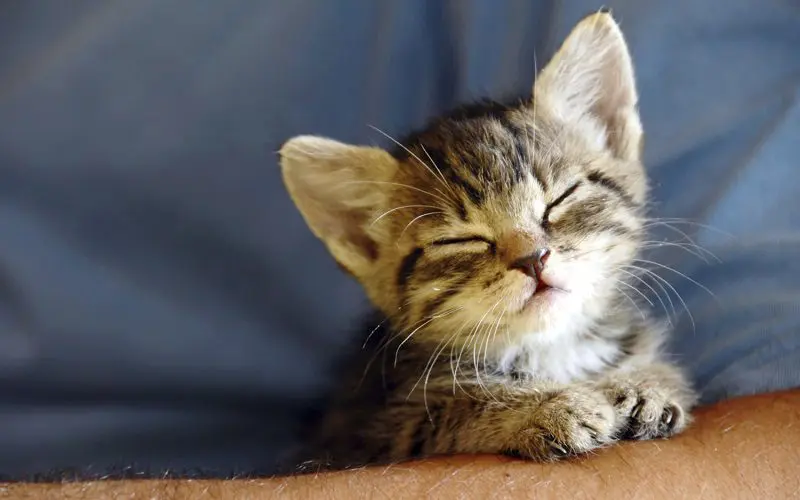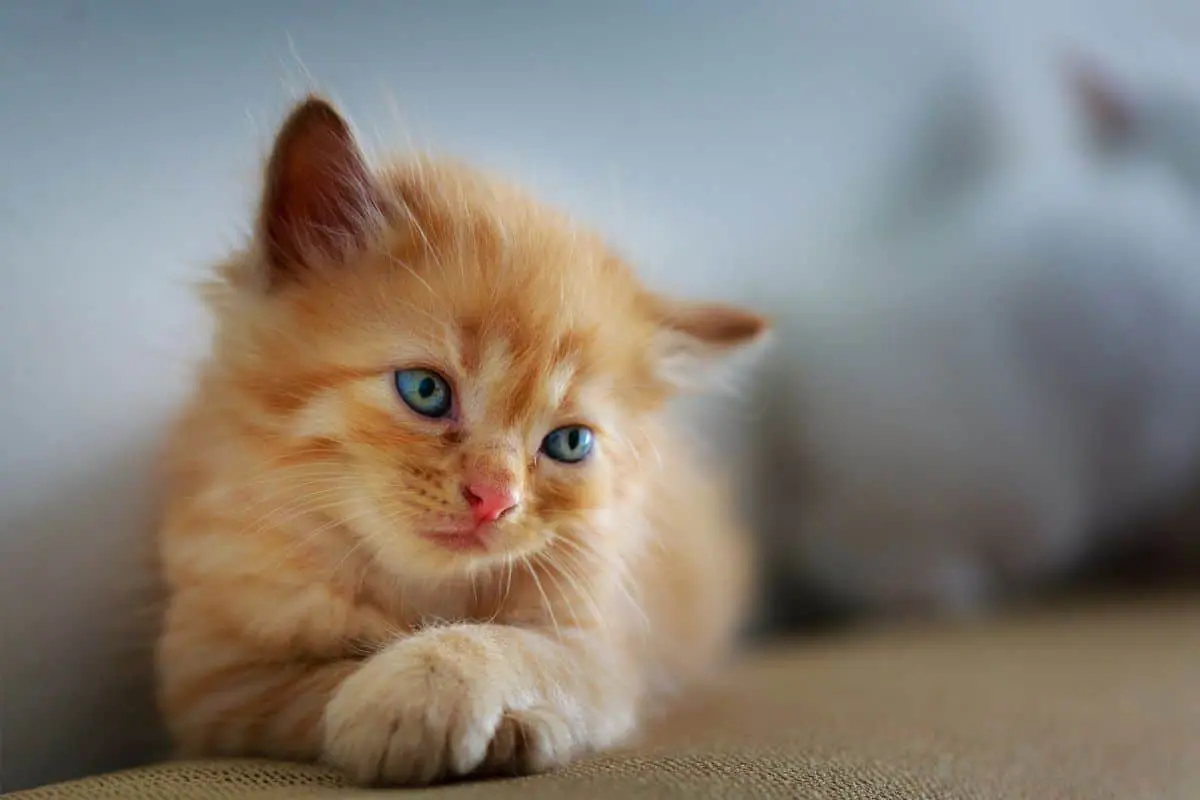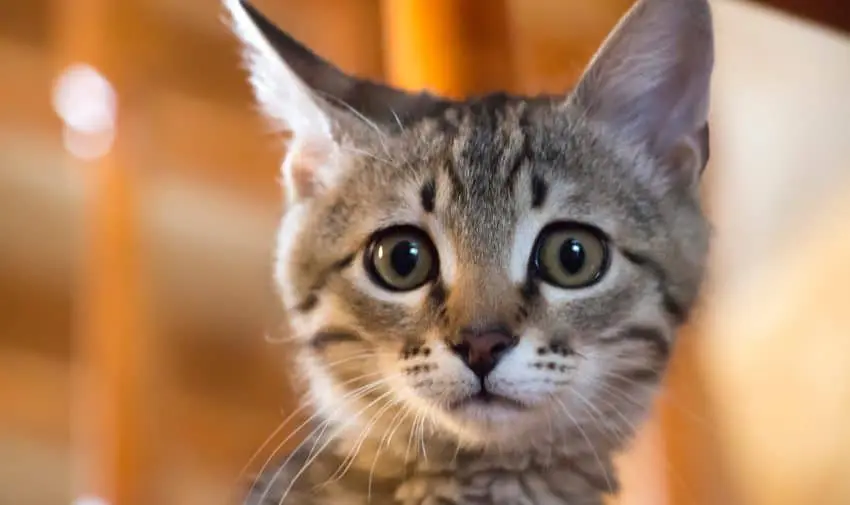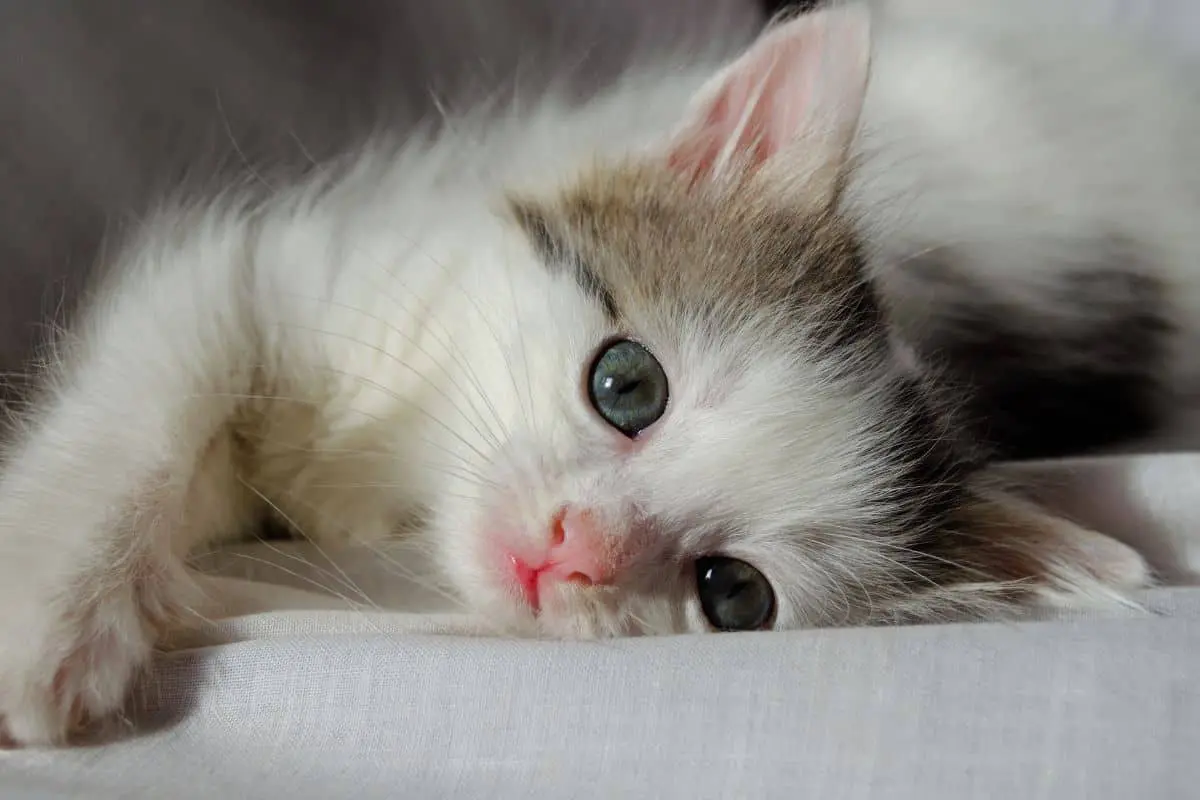Last Updated: 12 months ago
The first thing you expect to hear from a kitten’s adorable little mouth is a meow. When that doesn’t happen, you might be a little dumbfounded.
The truth is, there are several reasons why a kitten might not meow, or at least not initially!
They might not have learned to yet, or maybe they just prefer a different way of communicating. Every cat is different, just like people, so you can never really assume anything.
If your kitten isn’t meowing, and you want to know why, just keep reading.
We’re going to cover everything you need to know about kitten meowing issues!
#1 They Haven’t Learned To Meow Yet!

Did you know that meowing is actually a partially learned behavior?
Cats won’t typically use meowing as a means of communicating with other cats; it’s only for humans!
This means that it is very possible that your kitten just hasn’t learned to use this kind of vocalization yet.
Sure, most kittens will learn how to meow at a pretty young age. They will often demand milk from their mother by meowing constantly, after all!
However, this isn’t always the case, and it doesn’t always happen. Even then, having a kitten meow at their mother versus meowing at you are very different things.
Most kittens will quickly learn that they can communicate with you like they do with their mother.
Some studies have even suggested that kittens and adult cats can form their own meowing language with their humans.
These vocalizations are notably different from the sounds and meows made by feral cats. So, kittens will learn that meowing at you will get your attention.
They of course know how to meow, but they sometimes need a little time to learn that this sound doesn’t only work on their mother, but on their humans, too.
Their meowing behavior towards humans can take up to 4 months to perfect. However, even then, they may choose not to.
Meowing at humans will probably be learned a lot sooner if the kittens are with their mother for that time, and are shown that it is normal behavior.
#2 Your Kitten Prefer A Different Kind Of Vocalization

It is entirely possible that your kitten just doesn’t prefer meowing.
There are plenty of vocalizations to choose from for cats, and they might have favorites.
They can trill and chirp, and have lots of different meows; some just sound like adorable squeaks.
Your kitten could pick any one of these sounds or variations of the meow as their primary form of communicating with you.
Sometimes a sound might be so high-pitched that you don’t even hear it, and it comes out silent.
There is no right or wrong, because to them, it’s just a way of communicating. They might chirp to get your attention instead.
However, it’s worth noting that some vocalizations do have specific meanings associated with them. For example, chattering has been linked to excitement and the kill-bite in hunting.
Cats have preferences, so while most cats go for the usual meow, don’t expect it from all of them.
It might take a little while to learn what your specific kitten likes and how they communicate with you!
#3 They Are Just Naturally Quiet

Some kittens just like to be quieter than others! This doesn’t mean that anything is wrong.
It simply serves as a reminder that cats have unique personalities, just like people do.
You will know people who can talk and talk and talk, while others prefer to sit quietly and listen. Cats are the same. As such, a quiet cat doesn’t necessarily mean a sick cat.
On top of that, some breeds of cats are naturally quieter than others. The vast majority of Siamese cats will have a whole conversation with you if you meow back at them.
The British and American Shorthairs, on the other hand, are notoriously quiet. Different traits are bred into breeds, so you can have an idea of what to expect based on that.
This applies beyond meowing, too. Some cats are just the silent type, and won’t necessarily make any kind of vocalizations at all.
A cat that meows a regular amount might seem very quiet if you are used to spending a lot of time with Siamese cats!
Similarly, if you spend a lot of time with American Shorthair cats, the regular amount of meowing could seem like an awful lot to you.
#4 Stress Of Anxiety Is Impacting Them

Although less likely, it’s always worth mentioning unlikely reasons, too.
The first unlikely reason for your kitten to now meow is because they are stressed or anxious.
Fear responses with cats vary a lot, so don’t rely on an obvious response if your kitten is scared.
For many animals, including kittens, being silent when they are stressed is a perfectly normal behavior. This is particularly true in the case of feral kittens, or kittens that haven’t been socialized.
They are far less likely to meow or even vocalize at all if they are frightened and will instead freeze as a response.
With that being said, it is pretty easy to cancel out fear or stress as a reason for a silent kitten.
If you notice that your kitten seems quite happy and is running around the house, exploring, and being playful, they’re probably fine!
The ultimate test is whether they allow you to pet them or not (even if they are hesitant). If they aren’t hiding and instead spend time in open spaces, then it is very unlikely that they are afraid.
A scared cat will hide under furniture and in corners, not run around and be adventurous.
#5 They Have A Medical Issue

Once again, this is very unlikely, but still worth mentioning.
There is a very small chance that your kitten may have a medical issue that is inhibiting their ability to meow.
This isn’t even worth losing sleep over, but it’s something that you can look into if you manage to cancel all the other options out. URIs, or Upper respiratory infections, are basically feline colds.
They can cause conjunctivitis, congestion, and lethargy in cats. These can all make your cat not feel like meowing, much like you probably don’t want to talk loud or yell when you have a cold.
These infections are usually pretty easy to identify, and may show itself by your cat often sneezing, having watery eyes, or having a runny nose.
There are a variety of other medical possibilities, but they are also exceedingly rare. These include things like trauma to the cat’s vocal cords, or congenital deformities.
Deafness could also make a cat not meow – there are plenty of videos on the Internet of cats that are always quiet simply because they are dead!
Again, you shouldn’t worry and lose sleep over these things because chances are, your kitty is absolutely fine.
If you do notice a change in behavior, appearance, or overall health, you should definitely take them to a vet as soon as possible.
A lack of meowing and symptoms like sneezing or a runny nose or lethargy is cause for a vet to get involved and take a look.
#6 Your Kitten May Have Learned NOT To Meow

The final unlikely possibility is that your kitten was taught not to meow.
This may have been in the previous house they were in.
Like any animal or human, if they received a punishment every time they meowed, they would quickly learn not to do that.
This can result in a kitten not only being afraid to meow, but that contact with humans is generally a negative thing.
Any kind of punishment (being hissed at, smacked, or being sprayed with water) can cause this.
The majority of kittens are too stubborn to let things like this impact them, though.
So, while this option is extremely unlikely, it isn’t totally unfathomable. It can still happen, and it’s sad when it does.
Should You Be Worried About it?
Thankfully, a kitten that doesn’t meow isn’t seen as anything to be worried about at all.
This only becomes an issue when you notice other symptoms of distress of ill health along with the not meowing.
In that case, you should always make an appointment with your vet as soon as possible to get your kitty checked out.
If your kitten seems perfectly happy and healthy but still doesn’t meow, then don’t worry about it.
Chances are, that is just their personality (or breed), and they prefer to be quiet.
If the no meowing really bothers you so much, you can try to teach them – but that won’t be easy! You need a lot of time and patience, but we will go through that in the section below.
Can You Teach Them?
So… yes. You can probably teach your quiet kitty to meow if you really want to.
This will be done by using a lot of positive reinforcement, but you need to know that it will take time to get right.
You should also know that when they finally do learn about the benefits of meowing, it could become their new favorite thing.
When that happens, you could get a lot more noise than you initially bargained for, so this isn’t without risk. For anyone who isn’t familiar, positive reinforcement is simply rewarding behavior that you want.
When this is done, they will learn that when they do that behavior, they will get rewarded for it in some way.
This will form a connection in their brain and make them do that behavior a lot – because rewards! Rewards can be petting or food, but it’s most often done with a clicker.
Clicker Training
Using a clicker keeps things simple and reduces the risk of food being the only motivator in your pet’s life.
When your kitten does meow, you must immediately reward them for it. Give them treats, pet them, anything you choose to use.
Just make it clear that you are rewarding that specific behavior, and they will start to learn. Over time, your kitten will connect the dots and learn that meowing is good.
Now, that might sound pretty easy in theory, but the big problem is… how do you get your quiet kitten to meow in the first place?
If they are naturally quiet, getting them to start is the toughest part of the whole thing. Unfortunately, there is no one size fits all solution to this.
Why? Our cats are unique.
You could try meowing at them yourself. If you are a halfway decent meower, this option could get you somewhere.
Talk Or Play Videos
If you suck at the cat-talk, then maybe try another option. What would that option be? Play videos for them!
There are plenty of funny and cute cat videos plastered across the internet to pick from, just head over to YouTube or TikTok! Just be sure that any videos you show your kitten are of HAPPY cats.
There are plenty of videos of stressed cats on the internet, but those will do more harm than good. It’s like showing a toddler a video of a crying baby to stop them crying.
Videos are like a reward for you, too, so it’s a win-win situation. As soon as your kitten mimics a meowing cat, reward them.
Once you get that first meow out of your cat, the rest will be so much easier. Time and patience is all you need to teach your kitten how to meow at you.
Final Thoughts
While most cats are avid meowers, others just aren’t. If your kitten doesn’t meow, it doesn’t mean that anything is wrong with them.
They could just be a quiet cat, or they haven’t learned to meow at you for attention yet.
Either way, medical issues are rarely the cause, and if you are really bothered about your kitten’s silence, you can try teaching them how to meow yourself.
Overall, you shouldn’t let a non-meowing cat stress you out in any way.
Cats are unique, and some have different vocalizations that they prefer.
There’s nothing wrong with that!
Resources:
